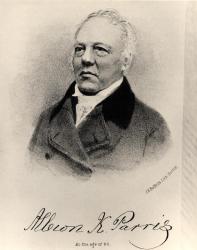Approximately 73,000 Mainers served in the Union Army and Navy during the war, the highest figure in proportion to population of any northern state.
Maine saw huge peace demonstrations, including a gathering of about 15,000 in Dexter, and along the border draft dodging was widespread; Aroostook County's forests became a thoroughfare for "skedaddelers."
The Civil War vexed the shipping industry with rising prices, tight money, and a general decline in cargo shipping, but in fact it simply hastened a long-term trend already evident by the mid 1850s.

Albion K. Parris, Portland, ca. 1848
Maine Historical Society
Reforms and Party Politics
An acutely self-conscious state aware of its vast economic potential and its promising political future, Maine emerged from the campaign for statehood with a broad array of ideas for perfecting its political and social institutions. This upwelling of reform shattered the fragile coalitions that made up Maine's early political organizations.
The state elected William King as its first governor, but when the legislature failed to put through his ambitious program of public improvements, he resigned in 1821. Others followed in quick succession. William D. Williamson, Benjamin Ames, and Albion Parris all served within the first few years of statehood.
Nationally, the election of Andrew Jackson in 1828 split the old Democratic party, and in Maine as elsewhere the 1830s were characterized by vicious campaigns between the new National Republicans (Whigs) and the Jacksonian Democrats.
Issues like the war with Mexico, the annexation of Texas, and the Wilmot Proviso tore at the seams of the Democratic party, while Portland's Neal Dow, destined to become America's preeminent liquor prohibitionist, divided his Whig colleagues.
A wealthy and politically ambitious young man, Dow campaigned vigorously for a liquor ban, forcing a weak version of his plan through the legislature in 1846. Dow was elected mayor of Portland in 1851, and that year his famous "Maine Law" – prohibition backed by stiff penalties and provisions for enforcement – passed the state legislature.

Neal Dow, Portland, 1874
Maine Historical Society
Dow had influential enemies due to his overbearing crusade for enforcing the Maine Law. Citizens attributed a riot at the City Hall in 1855 to Dow's fanaticism, and the incident sealed his political fate in Portland. Subsequent legislatures progressively weakened the Maine law, and Dow sought solace by carrying his temperance message to other states and abroad.
The anti-slavery movement was equally divisive, splitting the Democratic party into pro-South "Wildcat" and anti-slavery "Woolhead" factions. In 1848 delegates in Buffalo, New York, formed the Free-Soil party, dedicated to ending government support for slavery, providing cheap western land to farmers, and erecting high tariffs to protect American industry. The new party attracted disgruntled Whigs and Democrats in Maine.
A Whig, Zachary Taylor, won the presidency in 1848 as Maine elected Democrat John W. Dana governor, but only by a plurality. In 1850, as the nation divided over the issue of slavery in the territories acquired from Mexico, Woolhead Democratic Senator Hannibal Hamlin reached out to anti-slavery and prohibitionist Whigs and Free-Soilers in his senatorial bid.
Two years later when the Democratic legislative caucus nominated prohibitionist John Hubbard as governor, Wildcats bolted the meeting, and both factions nominated their own candidates in most country districts.
In 1854 the Nebraska Act re-opened the issue of slavery in the territories, and in Maine this made the split in the Democratic party irrevocable. Woolheads endorsed Anson P. Morrill as governor, and Wildcats gravitated toward the short-lived Liberal party. Whigs, too, divided over the Maine Law and anti-slavery, and the appearance of the nativist, anti-Irish Know-Nothing party further confused the situation in 1854.

Third phase, burning of Old South Church, Bath, 1854
Maine Historical Society
Morrill, who drew from Democrats, Whigs, Free-Soilers, and Know-Nothings, narrowly missed a winning majority, but the fusionist organization, called by some the Republican party, took the legislature and chose Morrill as governor, since no candidate achieved a majority popular vote.
Democrats won both houses in 1855, but in 1856 Republicans perfected their organization and won a landslide victory in the legislature, a vote that signaled a permanently altered political landscape for the state. The Republican party emerged out of the turmoil of slavery and liquor agitation to rule Maine political life almost without interruption until the election of Edmund S. Muskie in 1954.









